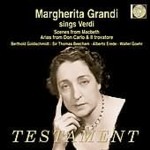Margherita Grandi (né Margaret Gard) was an Australian spinto soprano who certainly lived up to her adopted name, with a big, powerful voice and temperament to match. She had a successful pre-war career in Italy, sang to great acclaim at the Glyndebourne Festival on the eve of World War II, and returned to that venue in her signature role of Lady Macbeth in 1947. Our British cousins have something of a Grandi cult, and Testament’s booklet includes extravagant quotes from prominent critics–“the greatest voice I ever heard,” “she was incomparable,” and the like. Such encomiums generally activate my nonsense defense mechanisms, but on the basis of this recording, Grandi was an impressive singer, a throwback to an earlier era when Italian sopranos were more concerned with raw emotions than with conventionally pretty sounds.
Since Grandi’s discography is so limited, this Testament release becomes essential for those interested in her or in sopranos of the period. It contains two commercial recordings made in 1948–the Sleepwalking scene from Verdi’s Macbeth, conducted by Beecham, and “Tu che le vanità” from Don Carlo, with Erede. There’s also a significantly less successful live recording of Leonora’s “D’amor sull’ali rosee” from Il Trovatore. The rest of this nearly 80-minute disc is a private recording of Lady Macbeth’s scenes from the 1947 Glyndebourne staging.
Since she was in her mid-50s when everything on this disc was made, we have no way of knowing what she sounded like in her Italian heyday in the 1930s; but the voice here is full, with a soaring top and a rich, almost baritonal, bottom register. She’s Callas-like in her disciplined emotionalism and in her fearless, even reckless, singing. You never feel she’s husbanding her resources; even in Macbeth’s first act the attacks in “Or tutti sorge” are passionate, the leaps into the top register fearless, and her domination of the ensembles is complete, the voice riding effortlessly over orchestra and chorus. But Grandi’s not just a belter; she captures the dread at the start of “La luce langue” and the hushed stillness a bit later in the aria.
Her partners are of some interest too. Composer/conductor Berthold Goldschmidt conducts an idiomatic performance, and the Macbeth, the American Francesco Valentino (né Francis Valentine Dinhaupt), uses his fine baritone with subtlety. Testament substitutes the familiar studio Beecham version of the great Sleepwalking scene made some months after the stage performances. The intensity is still there, this time in sound no longer hampered by distortions, stage noises, and the limitations of “live” recordings of the period.
































